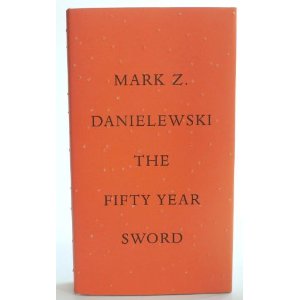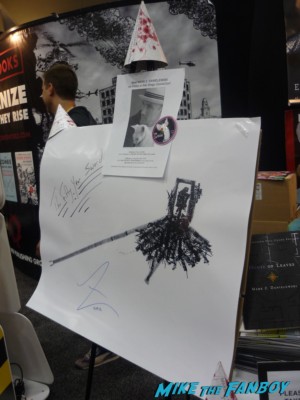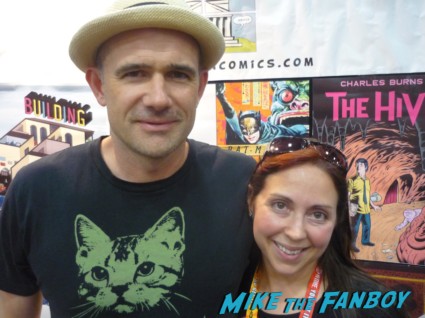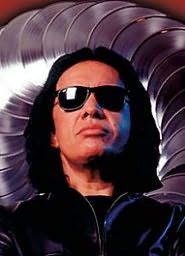The Novel Strumpet Interviews Mark Z Danielewski About His Awesome Novella The Fifty Year Sword!
The Novel Strumpet was very fortunate and was able to meet one of her favorite authors Mr. Mark Z Danielewski. She has a wonderful interview and so I’m not going to go on and on. Plus, I’m a tad nervous with my punctuation, fearing the giant spell checker online is going to come down on me. LOL…
Check out The Novel Strumpets interview with Mark Z Danielewski after the jump!
______________________________________________________________________________
A Talk with Mark Z Danielewski
It’s Friday at Comic Con and I am getting the chance to speak with author Mark Z Danielewski, whose novella “The Fifty Year Sword”, will finally be released stateside in October 16, 2012. I admit, I was a little nervous. To me, Danielewski is one of those writers who is so intricately artistic, so immersed in their craft, that I felt this was going to go two ways: 1) I meet with him and he’s so above me in every way, pulling things from the cosmos I could never hear, that I’d feel like a toddler trying to talk to a quantum physicist or 2) I meet with him and he’s so above me in every way, pulling things from the cosmos I could never hear, yet still easy to talk to and so fascinating I forget my questions.
Thankfully, it was the latter. He’s just one of those people who seems really excited to be talking about creativity and it’s infectious. And being a little “star struck” I totally forgot to get him to sign my birthday party hat…Strumpet fail However, I did remember to get a picture!
So here it is Mikethefanboy…fanboys/girls…we really should come up with a title for you guys, everyone else has one. The “FanPosse”? “Mike’s Menchs”? Hmmm…I’ll get back to you. Anyway, here is my interview with Mark Z Danielewski:

The Novel Strumpet: So I guess what I wanted to ask first was why are you releasing this novella now? Previously “The Fifty Year Sword” released overseas, was it the stage performances you’ve done the past two Halloweens?
Mark Z Danielewski: That had a big influence. It had a very nice run in Holland and then my editor and I, who are always doing something creative, said what about doing it a different way? So I said what about a graphic novel? That would be interesting and so we began to play with that. I started to work with a few graphic artists and it just didn’t work. The art was wonderful but it really wasn’t of the book. And then months turned into years and then it was like are we really going to do this? And by that point I was deep anyway in “The Familiar” and that was going nonstop.
And then in the meantime I had been invited to do a reading, and I thought well at least I’ll do a reading of “The Fifty Year Sword”, but then it became more complicated. I cast 5 actors, then there was a shadow caster, and we got some music going. By hearing it I began to visualize it more and see what was intrinsic and the main part in the thread. It’s all about fate. It’s all about a seamstress who thinks she can stitch together and repair what’s become unstitched, the way language is stitched together, the way voices are stitched together, the way meaning is stitched together…and so I realized that thread is the key. Then through some wonderful coincidences and happenings I ended up seeing how a sewing machine sewing up paper could create these images that were perfect because they were literalizing the thread that was metaphorically represented in the text. I didn’t want too much [thread] because it would be too much about image, but it could weave in and out. So there’s a lot of blankness in the book and then suddenly there’s these sewn landscapes and images that come into view. So that when it was finished I was like “this is the way the book is supposed to be”. If I had rushed it, if I forced a graphic novel out of it, it would’ve been wrong. I was trying to make a bonsai tree out of a redwood. It was it’s own thing, it was more complicated, it was more difficult, but we came out with something that was really thrilling and for me it sits as the book. Whether you like it or not, whether the artwork speaks to you or not, it’s still integral.
TNS: The books are performance pieces themselves and then [you] add the art, whether it’s albums influenced by them or stage performances, when you first started writing was that kind of your plan? To build these interactive books that readers have to get immersed in? Or did it just kind of happen as you were working on them and that’s how you started putting them together?
MZD: It’s both. I’d love to say I masterminded it all, but I say to people you write what you love and I wrote what I loved. A lot of people told me, and I guess it’s sort of true, that “House of Leaves” predicted reality TV shows and these viral videos with little snippets and clips, and I think in some ways that’s just the starting place. Because in that age (late 80’s heading into the early 90’s), at that point, a lot of people were experiencing this thing where they wanted to have something that was related to music, that was related to video, because everything was just so siloed. [This was] before the internet really because it was just coming to life in that period….which is funny because I never feel that my books really profit from the web. Even when I was writing “Only Revolutions” the web was not robust enough to do all the historical mining that I needed to do so I actually had to go to a library and look through microfilms even back in early 2000. There just wasn’t the density and historical evidence online. And the same was true with “House of Leaves”. I was publishing it online but it was this horrible website with backslashes and forward slashes…it was just a nightmare. But I think I was pursuing the connectivity that I see in books. I do like to see imagery, I do like to hear music, I do like to view art and I don’t think I was particularly unusual…maybe where I was unusual was my refusal to back down from the pursuit of that project.
TNS: Being a writer you are a storyteller. And your books have a tale, within a tale, within a tale…and with “The Fifty Year Sword” you actually have the storyteller there telling the story as the other stories are going on. Is there something about that mythos of the storyteller character that appealed to you or is it just that you’re a storyteller yourself so that’s how you identify?
MXD: Well we’re all storytellers, I just happen to publish my stories and interrogate stories to show where they succeed and where they fail. Sometimes we need that story to get us through a place. You know that famous Joan Didion quote “We tell stories in order to live” but I think the other part of that quote is that sometimes we need to kill our stories because some stories mislead us and betray us. And how often do we have those narratives in our head that constantly are misleading us? So in a lot of ways I’m interested in stories where something, like the sword, cut away those narratives that are holding us back because that’s another narrative to the thread. It all goes back to our petty grievances, our petty grief, our petty regrets. And sometimes we have to cut those away and re-stitch a new narrative to move us forward.

TNS: Is there a reason why you decided to take adult themes but package them in a supposed children’s story?
MZD: Well I think people get on this kick of the viewpoint of the children, and I was more interested in that meta-layer of the adults telling the story about the kids listening to a story told by an adult. So it’s a fuller loop there and that’s what I wanted to expand because it’s usually dyadic. It’s just the adults or it’s just the kids. But that’s not really how that system of storytelling works. It’s that moment when you’re very young and you happen to be invited to a place and it was an average day at an average place and it was an average encounter and you go home and you didn’t think about it…and then years later you hear that moments after you left someone went crazy and shot everyone. Or that person was a horrible predator but somehow you managed to breeze past that, I mean who knows. We’ve all had those encounters.
TNS: Do you think those themes are even more relevant now as a society, post 9/11, and this age where everything is more and more immediate…and all these stories about terrible things here and here and terror takes over…do you think in that atmosphere we’re even more aware of “oh my gosh any second something could come/happen?”
MZD: Well I think it’s about working through that too b/c we also know how much of it is fine. And we walk assuredly across many planks and we’re constantly over 100 ft dry wells. I think ultimately you make a choice to listen to that part of the world and recognize that there are themes and culture that want to embrace fear because it’s sensationalistic and it has all those elements. It’s something I constantly try to modulate, that sensational experience doesn’t interest me. I mean in “The Fifty Year Sword” there’s something absurd to be afraid of. So what if they’re inflicted with a wound that’s going to take effect decades later? That’s not what we’re used to in horror movies, it’s “something’s at the end of the hall crawling toward you”, something immediate. And yet there is something terrifying about that notion that you’re suddenly fated. A certain set of possibilities is removed from you.
TNS: So regarding “The Familiar”, are you continuing in this more overt supernatural thing you’ve got going with “The Fifty Year Sword”? The myths of people and animals, like witches having their familiars…
MZD: Absolutely, and what does familiar mean? Is it something strange…one thing you were talking about when we were talking about story and tales. I remember how important the word “story” was for “House Of Leaves”, because houses/big buildings have stories, they have levels, so that was an extended pun on stories. And then I was thinking about “The Familiar” and tales/tails is an important word. I mean it’s a silly pun but it is about the way the animal lives in us, and how important the animal is, that strange mute intelligence that we can’t quite fathom. Yet we understand, we detest, we love, we eat, we ignore, we poison…our relationship to that creature is significantly important. And it does tie into important ecological themes and that is a place for me of exploration and conflict […] it’s something that needs to be looked at, it’s a very complicated relationship, but it is the most significant relationship, how we relate to our environment. We are now at the age as a species where we are responsible for other species and we have to behave respectfully and responsibly.
TNS: Are you excited with this project, especially since it’ll come out in the future, about what technology will be out there that could give new ways of telling the tale itself?
MZD: Very excited, though it doesn’t seem that far away to me. It seems so close, breathing down my back. Right now, I’m really thinking “I should be working on it right now”
We laugh….
I finished volume 9 a week ½ ago and start volume 10 Monday so I’m ok…I’m alright, I’m alright…there’s a lot to be done. I’m very open to what the present – presents. I mean there are certain dating elements I have settled on like when certain things take place because I may set it in the present of when I’m writing it. So a certain scene exists but I may shift its placement according to what is coming on [technologically] at that moment, so I can actually allow the book to be of its time. So it will be of it’s time for a certain time, but then it will become something outside of the time of its publication. Which for most people doesn’t matter but for me it does. That placement. The fact that “House Of Leaves” takes place in 1993 is significant. So ultimately how it’s time stamped for “The Familiar” is going to depend on the discoveries at hand, artistic explorations at hand, all of it. I’m kind of thrilled.

*I want to thank Mark Z Danielewski for speaking with me and will point out that any mistakes made in punctuation, clarity and editing for length are mine and mine alone. I’d also like to thank the people at Pantheon Books for giving me , on behalf of Mikethefanboy, the opportunity to meet such a great author.
Share on Facebook



